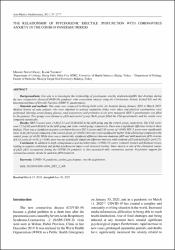| dc.contributor.author | Oğraş, Mehmet Sezai | |
| dc.contributor.author | Yıldırım, Kadir | |
| dc.date.accessioned | 2021-11-17T11:15:50Z | |
| dc.date.available | 2021-11-17T11:15:50Z | |
| dc.date.issued | 2021 | en_US |
| dc.identifier.citation | Oğraş, M. S., & Yıldırım, K. (2021). The relationship of psychogenic erectile dysfunction with coronavirus anxiety in the COVID-19 pandemic period. Acta Medica Mediterranea, 37 (5), 2377-2381. | en_US |
| dc.identifier.issn | 0393-6384 | |
| dc.identifier.uri | https://doi.org/10.19193/0393-6384_2021_5_368 | |
| dc.identifier.uri | https://hdl.handle.net/20.500.12899/473 | |
| dc.description.abstract | Background/aim: Our aim is to investigate the relationship of psychogenic erectile dysfunction(pED) that develops during the new coronavirus disease(COVID-19) pandemic with coronavirus anxiety using the Coronavirus Anxiety Scale(CAS) and the International Index of Erectile Function-5(IIEF-5) questionnaire. Materials and methods: This study was conducted in Elazig Fethi sekin city hospital during January 2021 to March 2021. Medical history of male patients who were admitted to urology outpatient clinics were taken and physical examinations were performed. Morning serum fasting glucose, total testosterone and prolactine levels were measured. IIEF-5 questionnaire was filled by the patients. Two groups were formed as pED and control group. Both groups filled the CAS questionnaire and the results were compared statistically. Results: IIEF-5 scores were 15.86±7.53 and 24.26±0.82 in the pED group and the control group, respectively. The CAS scores were 7.53±2.02 and 0.40±0.62 in the pED group and in the control group, respectively. There was a significant difference between these findings. There was a significant negative correlation between IEF-5 scores and CAS scores. (p*=0.00) IIEF-5 scores were significantly lower in the pED group compared to the control group. (p*=0.00) CAS scores were significantly higher in the pED group compared to the control group. (p*=0.00) While there was a statistically significant difference between moderate pED and mild moderate pED in terms of CAS scores (p*=0.02, p*=0.00), there was no statistically significant difference between mild moderate pED and mild pED. (p=0.27). Conclusion: In addition to high contagiousness and mortality rates, COVID-19 causes economic burden and financial losses, leading to negative individual and global psychosocial impact and increased anxiety. Since anxiety is one of the etiological causes of pED, pED encountered during the COVID-19 pandemic is also associated with coronavirus anxiety. Psychiatric support for coronavirus anxiety should be added to pED treatment. | en_US |
| dc.language.iso | eng | en_US |
| dc.publisher | Carbone Editore | en_US |
| dc.relation.isversionof | 10.19193/0393-6384_2021_5_368 | en_US |
| dc.rights | info:eu-repo/semantics/closedAccess | en_US |
| dc.subject | COVİD-19 | en_US |
| dc.subject | Pandemic | en_US |
| dc.subject | Anxiety | en_US |
| dc.subject | Psychogenic | en_US |
| dc.subject | Erectile dysfunction | en_US |
| dc.title | The relationship of psychogenic erectile dysfunction with coronavirus anxiety in the COVID-19 pandemic period | en_US |
| dc.type | article | en_US |
| dc.authorid | 0000-0001-7208-2170 | en_US |
| dc.department | MTÖ Üniversitesi, Tıp Fakültesi, Cerrahi Tıp Bilimleri Bölümü | en_US |
| dc.contributor.institutionauthor | Yıldırım, Kadir | |
| dc.identifier.volume | 37 | en_US |
| dc.identifier.issue | 5 | en_US |
| dc.identifier.startpage | 2377 | en_US |
| dc.identifier.endpage | 2381 | en_US |
| dc.relation.journal | Acta Medica Mediterranea | en_US |
| dc.relation.publicationcategory | Makale - Uluslararası Hakemli Dergi - Kurum Öğretim Elemanı | en_US |


















